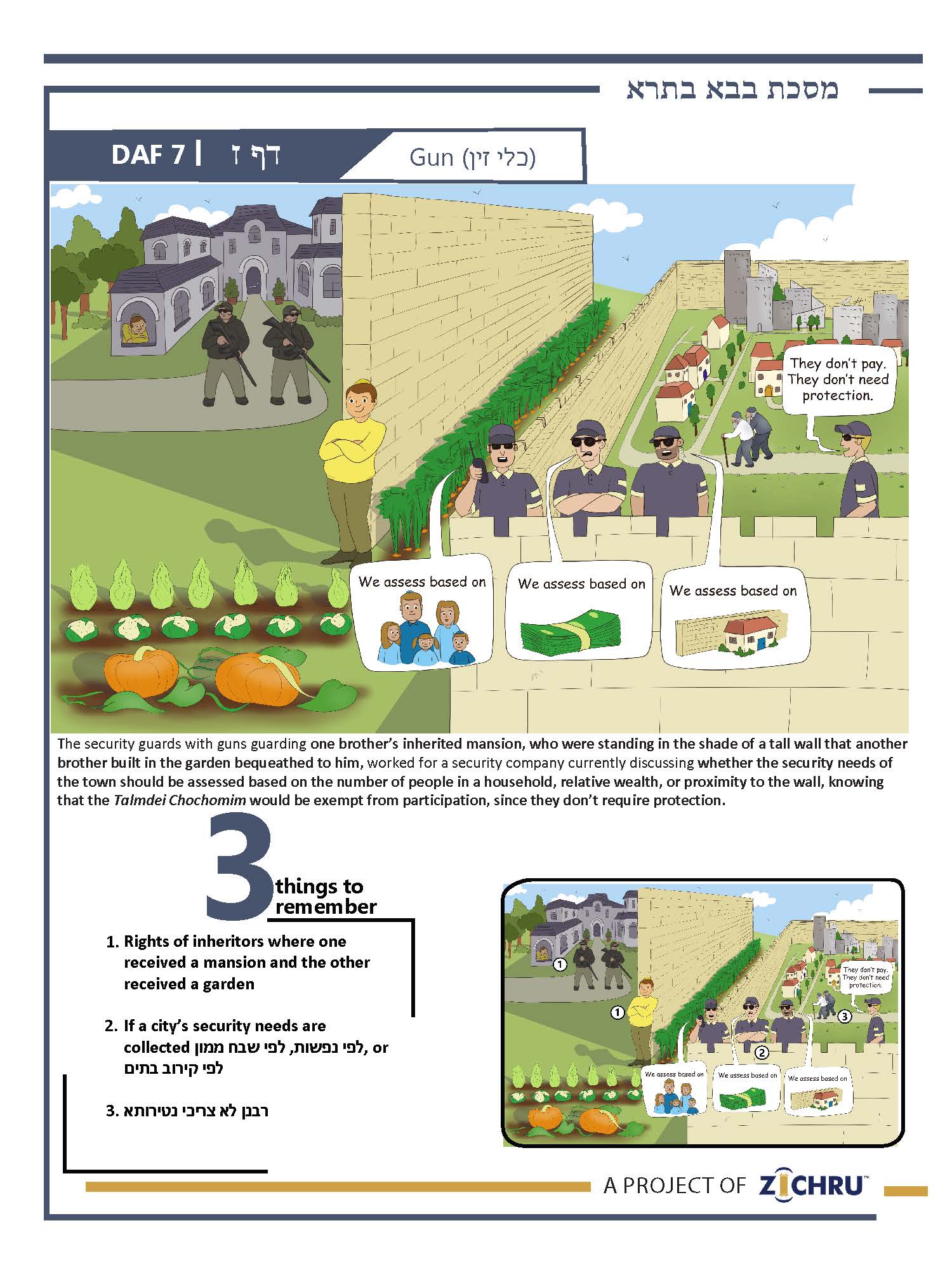Bava Basra - Daf 7
Audio Timestamps
0:00 - The 3 Sugyos
3:06 - Review of 3 Sugyos
5:55- Siman
8:21 - 4 Blatt Back Chazarah
16:40 - Pop Quiz (Last 7 blatt)
For access to all Zichru resources including PDFs, and illustrations CLICK HERE
- Rights of inheritors where one received a mansion and the other received a garden
Two brothers divided an inherited estate, where one received an אספלידא – mansion, and the other received an adjoining תרביצא – garden, through which sunlight illuminated the mansion. The owner of the garden built a wall near the mansion, blocking its light. When the mansion owner protested, his brother responded: בדידי קא בנינא – “I am building in my own property.” Rav Chama ruled in his favor. Although Ravina proved that inheritors ordinarily retain rights to all the necessities of the properties they took, that is דעלו להדדי – where they accounted with each other for the difference in value between the two properties. Although here, too, they surely accounted for the difference in value between a mansion and a garden, Rav Ashi explained that they only accounted for the value of the mansion’s materials, but not the airspace around it. Ravina protests further that the mansion owner can argue that he no longer has a mansion, but a dark room, and originally intended for a functioning mansion: דדאירנא ביה כי היכי דדרו אבהתן – “that I would live in it like our father lived in it.” The Gemara demonstrates that Amoraim argue about this contention and concludes that the halachah follows Rav Chama.
- If a city’s security needs are collected לפי נפשות, לפי שבח ממון, or לפי קירוב בתים
The next Mishnah states that all residents of a chatzeir must contribute to a gatehouse and door for the courtyard, and all residents of a city must contribute to a wall, doors, and a crossbar to protect the city. Rabban Shimon ben Gamliel argues that not all courtyards require a gatehouse and door, and not all cities require such protection (the Gemara explains their machlokes). Rebbe Elazar asked Rebbe Yochanan about the division of contributions: לפי נפשות גובין – Do they collect according to the number of people in each household, או דילמא לפי שבח ממון גובין – or perhaps they collect according to the relative wealth of each household? Do we consider the wall to be protecting their lives, or their property? Rebbe Yochanan responded that we collect according to wealth, ואלעזר בני קבע בה מסמרות – “and Elazar, my son, fix nails in [this ruling] to follow it.” In another version, Rebbe Elazar asked if they collect לפי קירוב בתים – according to the proximity of houses to the city’s edge (which determines their vulnerability to attack), or according to people’s wealth. Rebbe Yochanan responded that collections are לפי קירוב בתים.
- רבנן לא צריכי נטירותא
Rebbe Yehudah Nesiah required the Rabbis to contribute to the city’s wall together with the other residents. Reish Lakish objected: רבנן לא צריכי נטירותא – Rabbis do not require physical protection, as the passuk says: אספרם מחול ירבון – If I (Hashem) were to count them, they would outnumber the grains of sand. This cannot refer to righteous men (mentioned in the previous passuk), because all of Yisroel are described as being as numerous as the sand of the shore, so the righteous among them cannot outnumber the sand!? Rather, it is saying that the good deeds of the righteous outnumber the sand, so we can make a kal vachomer: if the sand protects the shore, מעשיהם של צדיקים שהם מרובים – then the good deeds of the righteous, which are more numerous, לא כל שכן שמגינים עליהם – certainly protect them! Thus, Rabbis do not require physical protection, and are exempt from the city’s security expenses. Rebbe Yochanan quoted a different source: אני חומה ושדי כמגדלות – I am a wall, and my breasts are like towers, the first term referring to Torah, and the second referring to Torah scholars, showing that Torah scholars protect the city, and do not require physical security.
Siman – Guns
The security guards with guns guarding one brother’s inherited mansion, who were standing in the shade of a tall wall that another brother built in the garden bequeathed to him, worked for a security company currently discussing whether the security needs of the town should be assessed based on the number of people in a household, relative wealth, or proximity to the wall, knowing that the Talmdei Chochomim would be exempt from participation, since they don’t require protection.


